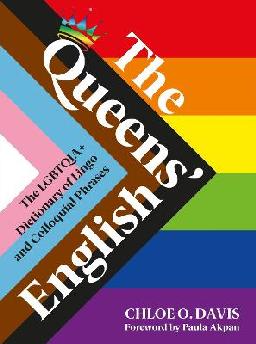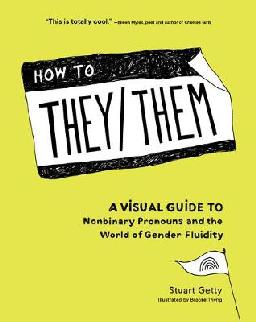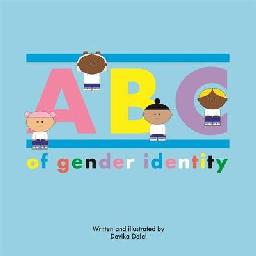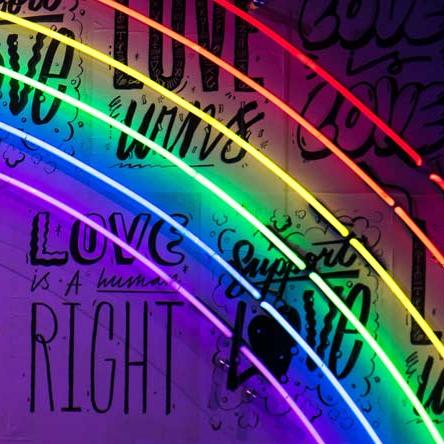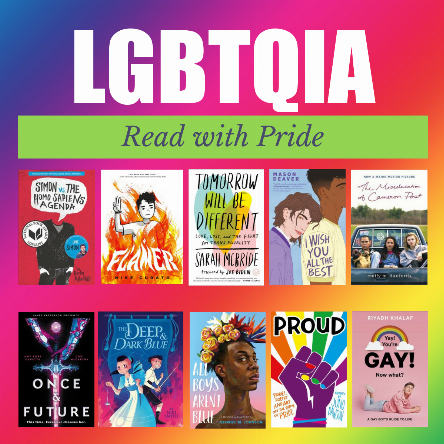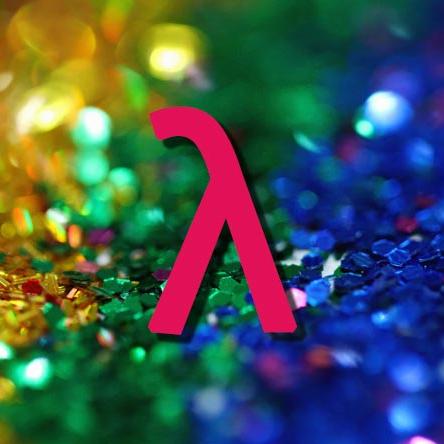LGBTQIA+ stories and resources at the library
The library catalogue groups topics under subject terms so we can find information in libraries. This is managed by the Library of Congress. The subject terms change over time to adjust to new terminology. The language of the LGBTQIA+ community is dynamic, creative, and evolving, while the Library of Congress takes time to change the terms they use, as they wait to see if terms become established.
This page will help you find LGBTQIA+ books and resources in our collection.
(LGBTQIA+ = lesbian, gay, bisexual, transgender, queer, intersex, and asexual. Other terms commonly used are LGBT, LGBT+, LGBTQ, LGBTQI, LGBTQI+, or LGBTQIA.)
Rainbow reading
LGBTQIA+ reading guide
Rainbow reads for rangatahi - teens
Searches
Alternative catalogue searches
Some current terms aren't in the library catalogue. Try these alternatives:
- Queer Sexual minorities
- Queer communitites Sexual minority community
- LGBTQIA+ Sexual minorities
- Gender fluid Gender-nonconforming people
- Rainbow Communities Sexual minorities
- Non binary Gender-nonconforming people
Recommended reading
The Queen's English: the LGBTQIA+ Dictionary of Lingo and Colloquial Phrases Chloe O. Davis
A landmark reference guide to the LGBTQIA+ community's contributions to the English language-an intersectional, inclusive, playfully illustrated glossary featuring more than 800 terms and fabulous phrases created by and for queer culture.
How to They/them: a Visual Guide to Nonbinary Pronouns and the World of Gender Fluidity Stuart Getty
Ever wonder what "nonbinary" or "gender nonconforming" really means? Why would someone choose to identify that way? And how the heck do you use "they/them" pronouns for a singular person isn't it supposed to be plural? This charming and disarming guide promises to unpack all these questions and more, with a fun, visual infographic approach.
Asexuality
A person who has no interest in or desire for sex. Some asexual people are aromantic, some are not. An aromantic person has no interest in or desire for romantic relationships.
Asexuality
Bisexuality
Someone who is attracted to more than one gender.
Bisexuality
Coming Out
Gay people
Gay people
Gender politics
Homosexuality
A person who is attracted to people of the same gender.
- Homosexuality
- Homosexuality and art
- Homosexuality and education
- Homosexuality and literature
- Homosexuality and motion pictures
- Homosexuality and music
- Homosexuality and popular music
- Homosexuality in animals
- Homosexuality in literature
- Homosexuality in motion pictures
- Homosexuality in the Bible
- Homosexuality on television
Homosexuality
Intersex
At birth a child may display variations or ambiguity in gender characteristics.
Intersex
Lesbians
A woman who has a sexual or emotional attraction toward women.
Lesbians
Queer Theory
Transgender
Transgender is an umbrella term for people whose gender identity and/or gender expression differs from what is culturally typically associated with the gender/sex they were assigned at birth.
Transgender
Two spirit people
A term used by some Native American / First Nations / Indigenous people to describe those who are not male or female.
Tagging
 You can use tags to find items in the library, as well as help other people find items you have enjoyed. The book Felix ever after for example has the subject heading Transgender people, but library users have also used the tag Non-binary.
You can use tags to find items in the library, as well as help other people find items you have enjoyed. The book Felix ever after for example has the subject heading Transgender people, but library users have also used the tag Non-binary.
LGBTQIA+ reading guide
Rainbow reads for rangatahi - teens
Lambda Literary Awards
Stonewall Book Awards
LGBTQIA+ reading guide
Rainbow reads for rangatahi - teens
Lambda Literary Awards
Stonewall Book Awards
Terminology
| agender | A person who does not consider themselves to have a gender. |
| androgyny | The physical and/or psychological state of being neither clearly male nor clearly female. For those who do not identify with any specific gender, androgeny aligns the mind with their physical appearance. |
| aromantic | A person who has no interest in or desire for romantic relationships. Some aromantic people are asexual, some are not. |
| asexual | A person who has no interest in or desire for sex. Some asexual people are aromantic, some are not. |
| ball culture | Referring to the underground masquerade balls and competitions from the 1970s onwards where LGBTQIA people (particularly young, gay African American and Latino men) competed in dance, performance and modelling competitions. Participants were often members of particular 'houses' which provided a type of chosen family. |
| bigender | People who identify as any two genders either simultaneously or as two separate personas |
| bisexual | Someone who is attracted to more than one gender. |
| cisgender | Individuals whose gender identity matches the gender or sex they were assigned at birth |
| cross dressing | People that play around with gender identity in terms of clothing. Less often used these days. Historically most often used to describe men dressing in women's clothing. Cross dressing is not the same as being transgender. |
| demigender | A term used for people who only identify with part of a gender, eg demiboy, demigirl. They may or may not identify also with another gender. |
| demisexual | A person who only experiences sexual attraction to people with whom they form an emotional connection. |
| drag | A performer, often a person assigned male or female at birth, who dresses in stereotypically feminine or male attire and enacts an overly-gendered persona for the purpose of entertainment |
| gay | Primarily used for men who are romantically or sexually attracted to other men. It however is also used to describe people of all genders who are attracted to their own sex. |
| genderfluid | A person who does not identify as having a fixed gender. They sees themselves as being male, female, or non-binary at different times or under different circumstances. Some people like to express different sides of themselves depending on who they are with or where they are. |
| grey sexuality | A type of asexuality - a limited desire for sexual relationships. Greysexuality is a spectrum, and 'greysexuals' may experience their greysexuality in different ways. |
| homosexual | A person who is attracted to people of the same gender. |
| intersex | At birth a child may display variations or ambiguity in gender characteristics |
| lesbian | A woman who has a sexual or emotional attraction toward women |
| LGBTQIA+ | Lesbian, gay, bisexual, transgender, queer and/or questioning, Intersex, asexual, aromantic, agender communities. + an acronym for all gender identities and sexualities |
| megasexual | A sexual orientation generally characterized by a person's lack of emotional connection to other people unless or until they have formed a strong sexual connection with them first. |
| non-binary | A gender not limited by masculine and feminine. Non-Binary people may express masculinity, femininity, both or neither. |
| pangender | A person who sees themselves as being all genders. They may see themselves as being different genders at different times, or all genders at once. |
| pansexual | A person who does not consider gender, when they are attracted to someone. They may not "see gender". |
| queer | An umbrella term to describe anyone who identifies as something other than heterosexual. |
| rainbow | A member of the LGBTQIA+ community. Using rainbow in this way is growing in popularity. |
| sapphic | The Greek woman poet Sappho (c. 630 – c. 570 BC) lived on the island of Lesbos, and her poetry often focused on her admiration of - and romances with - women. Sapphic is therefore used in terms of lesbian women. |
| sexqueer | A rejection of labeling one’s physical body as female or male. Being sexqueer is neither indicative of one’s current anatomy nor birth assignment or birth anatomy, and should definitely not be confused with intersex. |
| takatāpui | A te reo Māori word used for members of the LGTQIA+ community. |
| third gender | A person who does not identify as male or female. Historically, in some cultures, third gender refers to non standard gender representation, such as transgender people, or celibate priests. These days it is much more likely to refer to a person who is non-binary. |
| trans* | Some non-binary and other gender non-conforming people use trans* (with the asterisk, pronounced tran-star). This is to indicate that they’re definitely not cis, but not necessarily a trans woman/man either |
| transfeminine | Describing a person who was assigned male at birth, but whose gender identity is feminine. They may or may not identify as a trans woman. |
| transgender | An umbrella term for people whose gender identity and/or gender expression differs from what is culturally typically associated with the gender/sex they were assigned at birth. |
| transmasculine | Describing a person who was assigned female at birth, but whose gender identity is masculine. They may or may not identify as a trans man. |
| two spirit | A term used by some Native American / First Nations / Indigenous people to describe those who are not male or female. |
| voguing | A dance move comprised of a series of poses imitating a model at a photo shoot. Voguing originated in the gay black subculture of ballroom in the 80s. |
Related resources
The Homosaurus is an international linked data vocabulary of Lesbian, Gay, Bisexual, Transgender, and Queer (LGBTQ) terms. This vocabulary is intended to function as a companion to broad subject term vocabularies, such as the Library of Congress Subject Headings.


